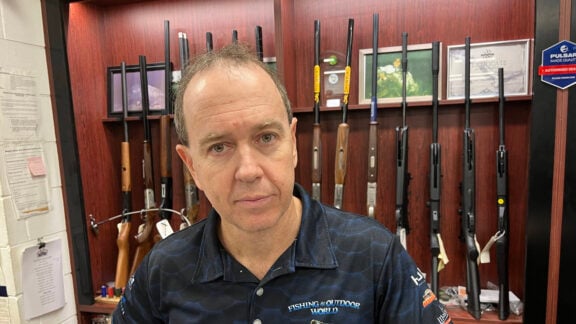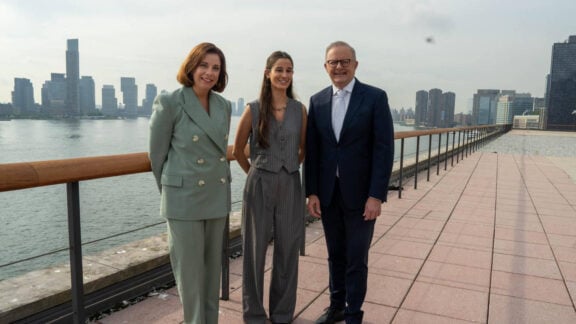The labour force shortage continues to pose challenges across various sectors of the Australian economy, with a particular emphasis on the aged care industry.
According to Faye Spiteri-Tsolakis OAM, CEO of Fronditha Care, the demand for caregivers and nurses who can communicate in Greek and understand Greek culture is growing.
Australia’s job vacancies have receded from the historic highs recorded during the COVID-19 pandemic, according to the latest data from the Australian Bureau of Statistics (ABS).
Nevertheless, the labour force shortage remains one of the most pressing issues, essential for supporting growth, productivity, and the delivery of crucial services to society.
Aged care, in particular, is experiencing a surge in demand due to Australia’s aging population.
The need for specialised professionals is further heightened among the Greek-Australian community, as seniors require care, healthcare services, respect, and dignity.
Historically, Australia has heavily relied on immigration for its progress, a trend dating back to the post-war era when numerous Greek immigrants arrived in the country. Australia’s dependence on immigrants remains.
The acting commissioner of Jobs and Skills Australia, Peter Dawkins, speaking at the National Press Club in Canberra, recently stated that Australia is grappling with a profound skills shortage that hasn’t been witnessed since the 1960s. The issue is further exacerbated by demographic changes, particularly the aging population’s growing need for aged care services.
An urgent priority
Addressing the aged care and healthcare sectors, there has been a 128.8 per cent increase in the demand for workers compared to the pre-pandemic era.
Moreover, Australia’s Intergenerational Report predicts an increase in life expectancy, further underlining the need for an expanded workforce in the care and support sector.
To combat the shortage of specialised professionals, several initiatives are underway.
Fronditha Care, for instance, has signed a company specific labour agreement with the Australian government since 2013, allowing for visa sponsorship for skilled professionals from Greece.
This agreement was renewed in 2018, and discussions are ongoing to extend it under new terms.
“Fronditha Care is one of the few organisations that has signed an agreement with the federal government to be able to grant work permits to Greek-speaking caregivers,” Spiteri-Tsolakis told Neos Kosmos.
“We have also submitted a relevant request for the renewal of the agreement, which we want to include other specialties in the aged care sector,” she explained adding that Australia needs further simplification of immigration restrictions, the creation of pathways for specialised workers, and a different distribution of the 200 minutes of care.

“However, we would like to see the simplification and acceleration of the processes related to granting work permits in Australia to professionals in the aged care and health sectors who come from other countries and can provide the necessary assistance to the elderly in Australia.
“Their qualifications and experience should be recognised more easily, and we should understand that as the elderly with linguistic and cultural characteristics different from the dominant ones increase, we need to have the appropriate workforce to serve them.
“For example, at Fronditha Care, we need more caregivers and nurses who speak Greek and understand Greek culture.”
Fronditha’s CEO also stressed that “now that it is mandatory for aged care organisations to prove that each resident of a nursing home receives at least 200 minutes of care per day (from accredited nurses), the need for personnel is even greater.”
“By simplifying immigration restrictions and creating pathways for skilled workers, we can bridge the gap in terms of the workforce and ensure that our elderly receive the high-quality care they deserve,” Faye-Spiteri said.
“Personally,” she pointed out, “I support these reforms, but I believe they need some changes to enable organisations to focus on the essence of support and not just on filling the above-mentioned care minutes.”
Out of the 200 minutes prescribed by the regulations, 40 pertain to the provision of nursing care, which, however, is provided only by ENs, she said, highlighting that at this point, we observe the non-recognition of the valuable contribution of nurses with critical responsibilities who fall within the framework of ‘basic’ aged care.
“This will create, and from my experience, I know it already creates many problems,” she told Neos Kosmos.
“Firstly, nurses are very likely to leave the aged care sector because organisations will hire only ENs to meet the care minute requirements, resulting in the loss of many nurses, along with their knowledge, who may have been working in nursing homes for decades. Nurses also perform the initial stages of many tasks completed by registered nurses. If there are no nurses, who will be able to perform these tasks, given that nurses already have an increased workload? I believe that nurses should be included in the count, and let’s not forget that today’s nurses are the ENs of tomorrow.”
Ms Spiteri-Tsolakis also noted that the significant role played by employees in activity-based care is not recognised, which can lead to disputes in the programs of many organisations.
“At ‘Fronditha Care,’ we have secured an active and varied entertainment and activity program, which includes music, dance, singing, handicrafts, and much more. The program is one of the foundations of the philosophy ‘Fronditha Care’ holds and embraces, covering not only the physical needs but also the cultural, intellectual, and psychological aspects,” she added.
Tripartite approach
The issue of personnel shortage, especially in elderly care, is not unknown to the federal government, which appears to have a split approach which includes immigration and acquiring the necessary skills from workers within the country or retaining those who already have specialisation after several years of employment.
Minister for Skills and Training Brendan O’Connor emphasised that the number of professions in the “critical” list increased from 153 to 286 within a year leading up to the federal elections of 2022.
The aging population will result in the elderly care and support economy expanding by nearly a quarter (22 per cent) by 2033, as stated in the white paper on employment released by the government.
The Minister for Immigration, Andrew Giles, and the Minister for Internal Affairs, Clare O’Neil, have repeatedly mentioned efforts to further reduce delays in processing visa applications, especially for skilled personnel.
Furthermore, since May, a ‘tripartite approach’ has been announced to address labour shortages, particularly in elderly care.
This approach involves employers/service providers directly sponsoring skilled workers with skilled visas, with an active role for unions.
“In collaboration with businesses and unions, the new labour agreement for the elderly care sector will promote increased recruitment and retention of the workforce,” noted the joint statement from Andrew Giles and the Minister for Elderly Care, Anika Wells, recognising that “the increase in the workforce… is necessary to improve care systems and restore the safety and dignity of elderly Australians.”
Further clarifying that this agreement “provides additional incentives for employers to attract workers, including a faster pathway to permanent residency.”
However, Mr Giles stated a few weeks ago that only eight elderly care service providers had signed the agreement, acknowledging that the system is still “in a very early stage.”
“We are in discussions, or rather, we are aware of discussions involving many other providers, as there is a genuine interest in this as part of a broader range of solutions to ensure that we do everything we can to support elderly Australians,” he said.
Meanwhile, shadow minister for Health and Elderly Care, Anne Ruston, mentioned that “the government should not impose unionism on service providers who are simply trying to comply with the urgent policies.”
National skills agreement
Earlier this month the new five-year National Skills Agreement (NSA) was signed, which will come into effect from January of next year.
The Albanese government is willing to invest up to 3.15 billion dollars to expand access to professional education and training in Victoria.
The investment will further bolster the existing state investment, exceeding 4 billion dollars in the sector since 2014, according to the relevant statement.
Notably, the new agreement places TAFE at the centre of reform and includes an additional 62,800 free education positions over the next three years.
At a national level, the federal government’s investment of 12.6 billion dollars includes an additional 2.4 billion dollars in “flexible funding” to support the skills sector across Australia.
Among the priorities are clean energy, construction, national security, digital technology, and care and support services.








